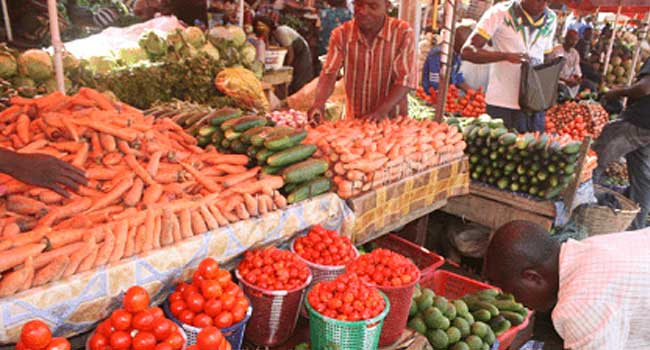
Data from the National Bureau of Statistics (NBS) shows that food prices have forced Nigeria’s inflation for the month of January 2020 to hit 12.13 percent, recording five months of consecutive increase.
The increase is 0.15 percent points higher than the rate recorded in December 2019 (11.98 percent).
The report from NBS released on Tuesday stated that the composite food index rose by 14.85 percent in January 2020 compared to 14.67 percent in December 2019, and
It revealed that the rise in the food index was caused by increases in prices of Bread and Cereals, Meat, Oils and fats, Potatoes, yam and other tubers and Fish.
“In January 2020, food inflation on a year on year basis was highest in Sokoto (19.08%), Ogun (18.72%) and Nasarawa (17.07%), while Bayelsa (12.91%), Delta (11.57%) and Benue (11.33%) recorded the slowest rise.”
READ ALSO: VIDEO: EFCC Claims Diezani Stole $2.5bn, Asks UK To Extradite Her
On a month on month basis, food inflation was highest in Ondo (2.95%), Anambra (2.61%) and Abuja (2.57%), while Benue, Kogi and River recorded price deflation.
Meanwhile, urban inflation rate increased by 12.78 percent in January 2020, while the rural inflation rate increased by 11.54 percent in the same month in review.
The country’s inflation rate had dropped from 11.40% in May 2019 to 11.02% recorded in August, but the recent rise in inflation started in September with 11.24%.
The Central Bank of Nigeria Governor, Mr Godwin Emefiele, expressed his displeasure at the inflationary pressure but was quick to assure that the trend will witness an immediate turnaround.
In October 2019, it rose to 11.61% which experts believe the rise in inflation rate may be connected to the ongoing border closure which had made it difficult for products to be exported and imported into the country through the land borders.
But NBS noted in its inflation report that the border closure had not started to reflect on the economy as the border was only closed on 20th August 2019
The month of November was no different as it witnessed a third consecutive rise to 11.85 Percent even as the effects of the border closure bit harder on consumer goods.
Again in December, inflation increased by 11.98, higher than the 11.85 percent recorded in November, with composite food index rising by 14.67 percent.




